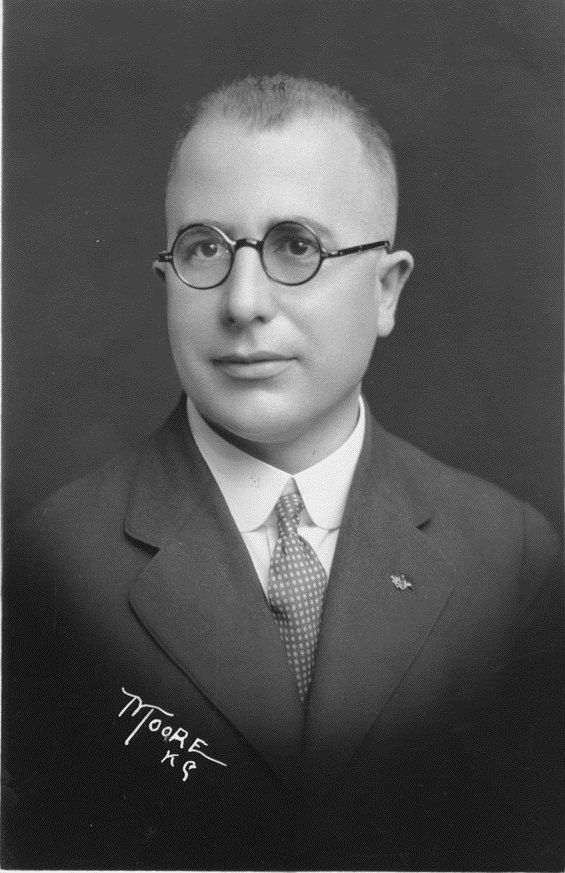John B. Bisceglia
Social worker, teacher, pastor, scholar, civic leader—if ever Kansas City produced a Renaissance man it was the Reverend John B. Bisceglia.
He was born Giovanni Battista Bisceglia on November 1, 1891, in Foggia province of the Puglia region of Italy. He immigrated to America in 1905 with his parents and seven brothers and sisters. The family lived for a short time in New York before settling in Pittsburgh.
Giovanni was studying medicine at the University of Pittsburgh when he experienced a self-described “born-again conversion.” Convinced that God had called him to preach, Bisceglia enrolled at Western Theological Seminary and graduated with a Bachelor of Sacred Theology degree in 1918. Having already shocked his family by leaving the Roman Catholic Church, he must have convinced them that he was completely mad when he accepted a position in the rough, far-away town of Kansas City, Missouri, as Assistant Pastor at Central Presbyterian Church and director of their Italian Mission. Isabella Fragale, whom he had met in her father’s Presbyterian Church in Pittsburgh, apparently did not think he was mad, as they were married in 1919, and she joined him in Kansas City.

John B. Bisceglia, as he now was known, faced a daunting task in Kansas City. Central Presbyterian’s ministry to the Italian community in the North End had been started by a few volunteers in 1908. The Central Chapel and Settlement House at 505 Forest Avenue resembled other such efforts to improve the lives of new immigrants. The project faced formidable obstacles, however, and by 1918 it was foundering. A series of Home Missionaries had directed it for short periods. Most of the wave of Italian immigrants who arrived in Kansas City in the early twentieth century were Sicilians who had come to work on the railroads. Most were illiterate in their own language and were overwhelmed by the strangeness of their new country. Protestantism was a hard sell among a traditionally Roman Catholic group. Bisceglia “inherited a church without a congregation and a social work without a constituency.”
The energetic, young pastor immediately swung into action, starting programs and ministering to his flock. A kindergarten came first, then a free nursery school for working mothers. Sports teams and organizations like Boy Scouts and Campfire Girls followed. A free clinic was established, as well as adult education programs and mothers clubs. He instituted a Sunday evening service in Italian. Isabella Bisceglia was a talented musician who played the organ and piano, directed choirs, taught Sunday school and led scout troops while raising their four children.
The Italian Institute’s programs eventually expanded to the wider community in northeast Kansas City, and in 1941 the new Northeast Community Center, at Independence Avenue and Wabash Boulevard, opened. Christ Presbyterian Church opened next door as an independent congregation in 1946. Bisceglia’s ministry started with six families; by the time he retired in 1965, it served more than 1,000.
Bisceglia was a scholar as well as a man of action. His sermons, in both Italian and English, were famous for their eloquence, clarity, and sincerity. He was the author of numerous articles, tracts, and books on theology, Italy, and Italian Americans. He received several awards for his work and was in demand as a speaker and preacher.
In 1924, he started publishing Il Piccolo Messagero, later shortened to Il Messagero. This bi-weekly newspaper was initially almost entirely in Italian. It included news of the Italian community, literary pieces, poetry, and Italian and American history.
When it became evident that the free clinic needed a pharmacist assistant, he returned to college and earned a degree in pharmacy at the University of Kansas City. He also received his Doctorate of Theology from Central Baptist Seminary in Kansas City. He served as Moderator of the Presbyterian Synod of Missouri in 1939.
If all this weren’t enough, Bisceglia also taught Italian from his time in seminary until well into retirement. He taught at the Music Conservatory and the University of Missouri-Kansas City for 30 years and, in his later years, held Italian classes in his apartment at The Sulgrave. His students were captivated by his obvious love of his native language and culture and the enthusiasm which he passed along to them.
The many people whose lives he touched—as pastor, social service provider, teacher or friend—all described generosity and love as his most essential characteristics. “His kindness,” wrote his son-in-law, “was inseparable from his being.”
John B. Bisceglia died December 1, 1988, at age 97. In 1996 the Bisceglia Cultural Center, in the Northeast Community Center, was opened to carry on his mission of bringing Italian language and culture to the Kansas City community.
A version of this article previously appeared at http://www.kchistory.org/content/biography-john-b-bisceglia-1891-1988-cl...
This work is licensed under a Creative Commons Attribution-NonCommercial-NoDerivatives 4.0 International License.
